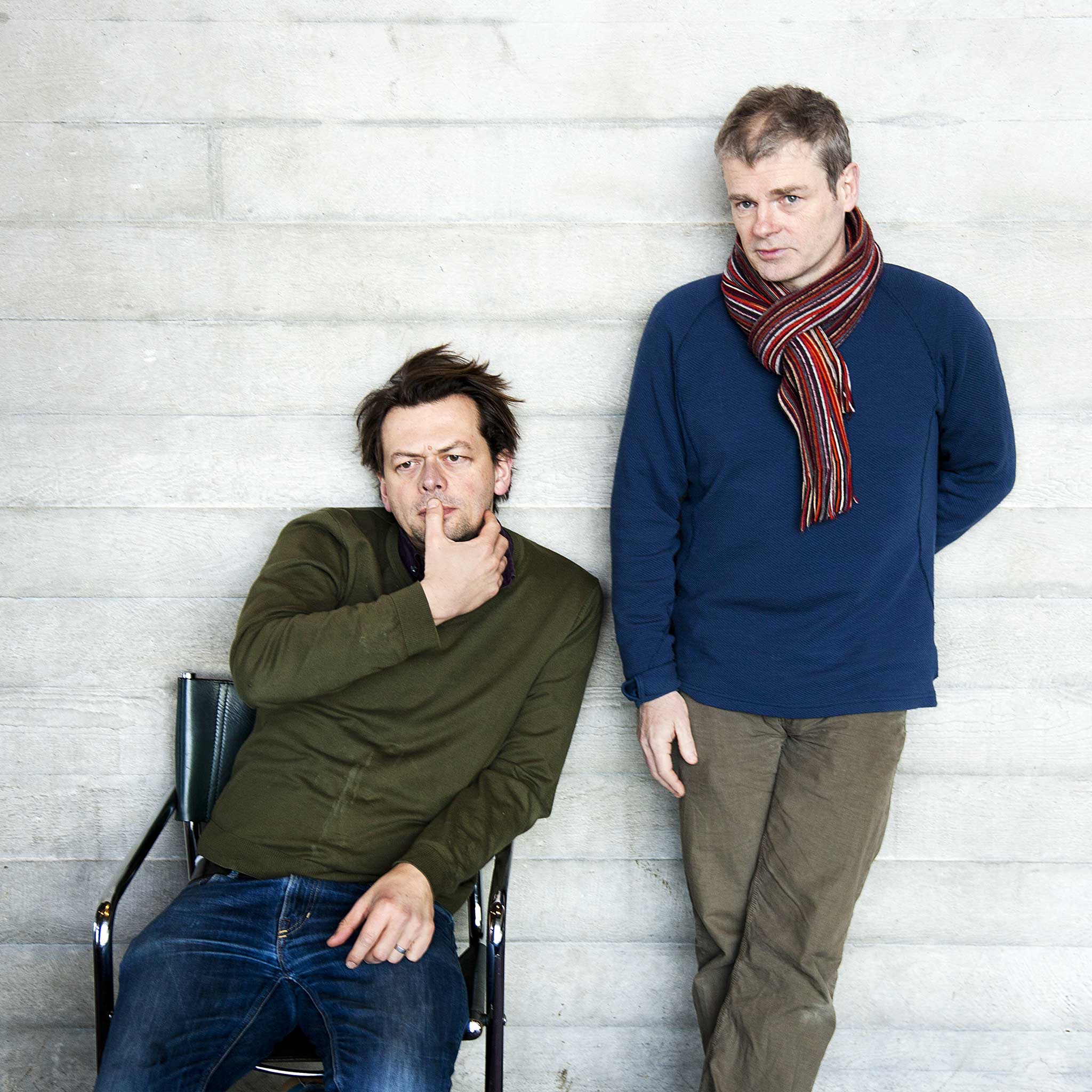How We Met: Simon Stephens & Mark Haddon
'He laughs a lot for someone who writes about people being bludgeoned to death'

Mark Haddon, 50
Having written children's books for 15 years, Haddon (right in picture) was catapulted to fame by his first adult book, 'The Curious Incident of the Dog in the Night-Time', in 2003. He has since written several more novels and published a collection of poetry. He lives in Oxford.
I was attached to the National Theatre at the same time as Simon, about five years ago, and we connected over music and our love of moaning: we seemed to share a hatred of the same plays.
After our residencies were over, he sent me his script for [his play] Harper Regan to read over. I was touched, and I started sending him stuff to read too. The art of finding someone to read your work over is getting a person who can tell you what's wrong with it in a way that chimes with your own misgivings.
The theatre is much more supportive than the literary world. You almost never see a playwright review someone else's work – it's seen as an appalling idea as it can generate negativity around a play. Yet novelists are asked to do it all the time.
I'm addicted to reading plays before I see them as often you can get dazzled, confused or misled by a production. I find Simon's plays funnier on paper than in the theatre, and I think we share a black humour. I particularly like the fact that such a positive, warm person produces such nihilistic material.
A few people offered to write musical adaptations of The Curious Incident, but I felt I couldn't risk it, particularly as I knew Simon could do it better as a play. And what he has now done comes across as warm, but avoids sentimentality. When you look at it, you really can't spot the join between my work and his.
Recently, I've spent more time looking at his face on a piece of paper than looking at his actual face as he came to Oxford and I took hundreds of photos of him to paint his portrait. It's hard to get him to sit still as he's very animated; he laughs a lot for someone who writes about being people bludgeoned to death.
The main difference between us is the way we write. I'm very envious of how Simon can spend months thinking, but when he writes, it happens very fast. Whereas everything I write goes through 50 drafts: when I'm on draft 35 I think of Simon with some annoyance, swiftly ploughing his way through.
Simon Stephens, 42
The Olivier-winning playwright is best known for the bleak world views and muscular narratives of his productions, including Iraq War drama 'Motortown', bittersweet family drama 'Harper Regan' and sex-trafficking drama 'Three Kingdoms'. He lives in London.
I read The Curious Incident of the Dog in the Night-Time while researching Motortown, as my main character's brother, Lee, has Asperger's syndrome, like Christopher, Mark's main character. It was a startling book and it's clear why it became a bestseller: Christopher sees the world with remarkable clarity and truthfulness. All of us find the nature of human interaction bewildering, but he's just honest about it.
We finally met while I was a resident dramatist at the National Theatre in 2006, when Motortown was being staged and Mark had a residency there. Our defining connection was that we were both grumpy men in our forties with children. We'd sit down over lunch, grumbling about how indie music wasn't as good as when we were teens.
Mark had been given lots of offers to adapt his book for the stage – mainly musicals – but they'd all been rejected. So when he asked me to do it, I was daunted but also excited at integrating those characters in the novel more thoroughly, and for me it was one of the joys of the adaptation. There's a symbiosis between us, something in the way we think and reason that draws us together, while we both share literary ticks such as our use of emphasis and concrete nouns.
I think he's sick of the book to an extent. He's subsequently written two beautiful novels for adults, written a TV drama and a collection of poems, but all he's ever asked about is Curious Incident and I think he feels he's talked it to death.
When it comes to our personalities, I'm less shy than he is – novelists spend so much time in isolation – but I'm always impressed by his capacity to observe the idiosyncrasies of how people walk: he does a brilliant impression of my stride.
I went to see him in "Dog Towers" in Oxford recently. I don't have many friends quite as rich as him – or quite as honest about his commitment to paying more tax. Politically we share a lot.
When we hang out now we don't talk about books or the theatre but about music and our kids – though of course it is flattering to form a friendship with someone who has had such a big impact on the literary landscape.
'The Curious Incident of the Dog in the Night-Time' opens at the Apollo Theatre, London W1, on 1 March (tel: 020 7452 3000, curiousonstage.com)
Join our commenting forum
Join thought-provoking conversations, follow other Independent readers and see their replies
Comments
Bookmark popover
Removed from bookmarks